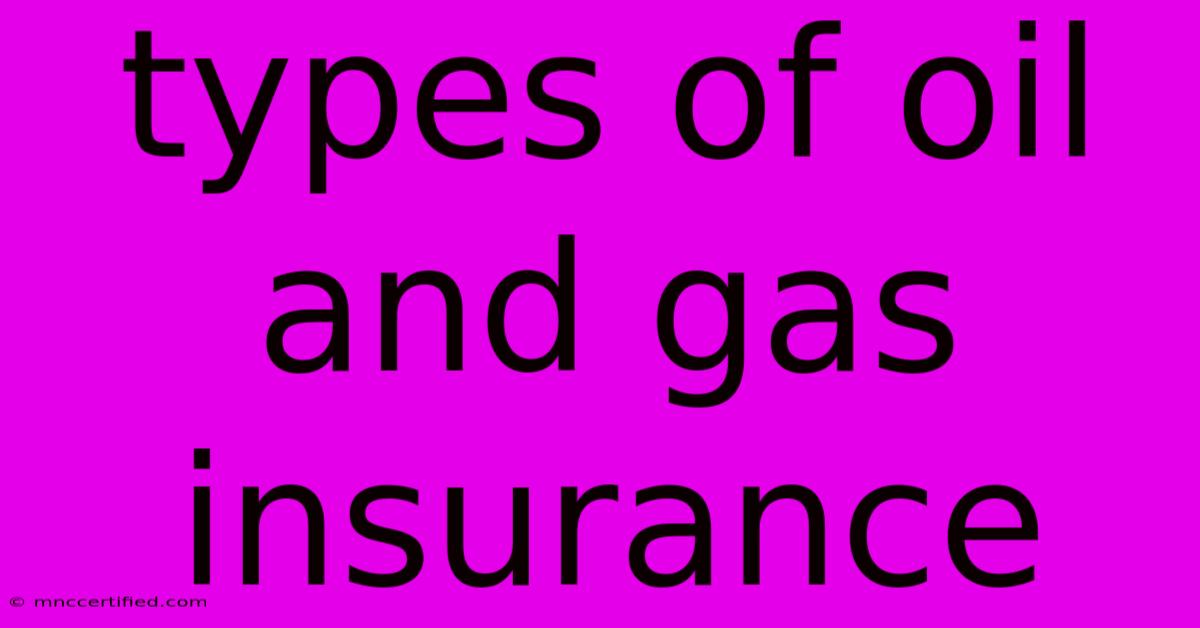Types Of Oil And Gas Insurance

Table of Contents
Types of Oil and Gas Insurance: A Comprehensive Guide
The oil and gas industry is inherently risky. From volatile energy markets to the complex machinery and hazardous materials involved, numerous factors contribute to potential financial losses. This is where comprehensive insurance plays a crucial role. Understanding the different types of oil and gas insurance is vital for mitigating these risks and protecting your business's financial stability. This guide will explore the various types of insurance policies commonly used within the oil and gas sector.
Key Oil and Gas Insurance Types:
The insurance needs of an oil and gas company vary significantly based on its size, operations, and geographical location. However, several core insurance types are essential for most players in the industry.
1. Upstream Insurance:
Upstream operations involve exploration, drilling, and production. Risks here are considerable, requiring specialized insurance:
- Well Control Insurance: This covers the costs associated with well control incidents, including blowouts, fires, and other emergencies. It's critical for mitigating the potentially catastrophic financial consequences of uncontrolled wells.
- Drilling and Completion Insurance: Protects against losses arising from drilling and well completion activities. This includes damage to equipment, environmental contamination, and delays.
- Operator's Extra Expense Insurance: Covers additional expenses incurred in rectifying problems during drilling or production, such as unforeseen delays or equipment failures.
- Pollution Liability Insurance: This is paramount, covering cleanup costs and liabilities related to pollution caused by oil spills, leaks, or other environmental incidents. Environmental regulations are stringent, making this coverage essential.
- Loss of Production Insurance: Compensates for lost revenue due to unforeseen events that halt or significantly reduce production, such as equipment failure or natural disasters.
2. Midstream Insurance:
Midstream activities encompass the transportation, storage, and processing of oil and gas. Insurance needs here focus on safeguarding these crucial logistical elements:
- Pipeline Insurance: This covers damage to pipelines, including leaks, explosions, and third-party liability arising from pipeline incidents. Protecting infrastructure is key for maintaining operational efficiency and preventing environmental damage.
- Storage Tank Insurance: Protects against losses due to leaks, spills, or explosions from storage tanks. This often includes coverage for environmental remediation and third-party liability.
- Transportation Insurance: Covers risks associated with transporting oil and gas by various means, such as trucks, trains, and ships. This includes cargo damage, accidents, and liability for damages caused during transit.
3. Downstream Insurance:
Downstream operations involve refining, marketing, and distribution of oil and gas products. The risks here are different from upstream and midstream, requiring tailored insurance coverage:
- Property Insurance: Protects against damage to refineries, distribution centers, and other downstream facilities due to fire, explosion, natural disasters, or other perils.
- Business Interruption Insurance: Covers lost revenue and expenses incurred during periods of business interruption due to insured perils. This is crucial for maintaining financial stability during downtime.
- Product Liability Insurance: Protects against claims arising from bodily injury or property damage caused by defects in the company's products.
- General Liability Insurance: Covers claims for bodily injury or property damage caused by the company's operations or employees. This is a fundamental insurance for all businesses, regardless of sector.
Choosing the Right Oil and Gas Insurance:
Selecting appropriate insurance requires careful consideration of your specific risks and operations. Working with a specialist insurance broker experienced in the oil and gas sector is highly recommended. They can assess your unique needs and help you design a comprehensive risk management strategy that includes the necessary coverage at competitive premiums.
Factors to consider when choosing your policy:
- Coverage Limits: Ensure sufficient coverage limits to adequately protect against potential losses.
- Deductibles: Balance the cost of deductibles against your risk tolerance.
- Policy Exclusions: Carefully review policy exclusions to understand what isn't covered.
- Insurer Financial Strength: Select a financially stable insurer with a proven track record.
Implementing a robust insurance program is not just a cost; it's a crucial investment in the long-term viability and success of any oil and gas operation. Thorough understanding of these different policy types empowers companies to make informed decisions, protecting their assets and reputation in an inherently high-risk industry.

Thank you for visiting our website wich cover about Types Of Oil And Gas Insurance. We hope the information provided has been useful to you. Feel free to contact us if you have any questions or need further assistance. See you next time and dont miss to bookmark.
Featured Posts
-
Morgan Freeman 87 Looks Healthy
Nov 27, 2024
-
Mens Team Wins Overtime Battle Against Notre Dame
Nov 27, 2024
-
Wyshbox Life Insurance Reviews
Nov 27, 2024
-
Top Ranked Kansas Vs Flagg
Nov 27, 2024
-
Ice Age Cub Remarkable Discovery
Nov 27, 2024